Navigation is the number one cause of stress between couples that travel or live full-time in an RV.
Okay, this claim might not be substantiated, but anyone who has traveled any distance with their partner in an RV knows that even the slightest of navigation errors can have grave consequences.
Technology has come a long way since my family first began traveling in an RV.
Back in those days, we used a good old-fashioned atlas to pick our routes and decide on potential campgrounds.
Those old Wal-Mart atlases still hold a special place in my heart, and I actually still keep one in my RV to this day.
While it can be a good idea to keep an atlas on hand for emergency navigation purposes, most high-tech RVers these days rely on GPS units that make navigation much easier.
With definite displays and a host of navigation features, a GPS unit is a great tool to take the stress out of navigating to your next campground or RV park.
RV GPS units typically mount on the dashboard where the driver can easily see the display without taking your eyes off the road.
When they do their job effectively, they provide advanced notice when a turn is coming up, alert you to upcoming traffic as a result of an accident, and provide real-time information on low-hanging bridges or other obstacles that RVs should avoid.
Regrettably, not all GPS models made for RV navigation live up to catchy marketing copy on their packaging.
So, the tricky part is figuring out best GPS system that are specifically designed for RVers. Well, you no longer need to worry because we have you covered.
In this article, I’ll review six of the best RV GPS units that actually perform and define the best use for each.
I’ll also dive into a comprehensive GPS buying guide, which includes how to decide which model is best for your needs.
I’ll conclude the article with answers to the most frequently asked questions about RV GPS units.
Our At-A-Glance List of the Best RV GPS Choices for 2024
If you’re looking for a reliable GPS device to navigate on the road, check out our list of the top six best RV GPS options to buy in 2023. These devices will ensure that you never get lost again, even if Google Maps fails to work.
6 Of The Best RV GPS detailed Reviews
Garmin, Magellan, and TomTom are three of the most trusted names in GPS navigation, regardless of the vehicle you’re traveling in or the terrain you’re navigating through. Here are 6 of the best RV GPS units for you to choose from!
1: Best Overall: Garmin RV 785 Advanced GPS Navigator For RVs With Built-In Dash Cam
When your cheaper GPS unit takes you down a road that isn’t built for a vehicle the size of your RV, you’ll be wishing you had invested in the Garmin RV 785.
This RV GPS unit offers a huge host of features and it allows you to customize your route so that you can avoid low bridges, steep inclines, and sharp curves.
This feature is really important when you’re operating an RV that just isn’t made for every single road out there.
With a seven-inch screen size, it won’t be hard for you to see that upcoming turns on the display from the captain’s seat of your RV.
The high-resolution touch screen also allows you to navigate between screen options and make changes to your route without having to squint at a tiny display or worry about properly pushing small buttons.
As we move into the age of smart technology and self-driving cars, this unit definitely feels like the next generation of RV GPS technology.
It is compatible with a back-up camera to help you navigate tight spaces and comes with lane-departure and forward-collision warnings to help make your RV travels safer.
I also love the fact that the built-in dashcam automatically records footage, as well as GPS location and time information, if it detects an incident.
Things We Like
Things We Don’t Like
2: Largest Display: Magellan RV 9365T-LMB RoadMate 7-Inch RV GPS Navigator
One of the best features of this RV GPS unit is its large display. If you want a GPS that won’t leave you feeling confused when you need directions urgently, the Magellan RV 9365T-LMB RoadMate is a great choice.
It allows you to program in your RV’s exact dimensions so that the routes it selects don’t include any obstacles that would make it difficult for navigating a large vehicle.
The RV-specific features of this GPS unit include gas station locations sorted by whether they offer diesel or standard gas, the Good Sam Travel Guide and Campground Directory, a database of Sani-dump locations, and the ability to save location information (i.e. longitude and latitude).
It also syncs with your smartphone via Bluetooth technology so that you can make and receive hands-free communications while driving.
One thing that has often bothered me about GPS units is the timing of the directions. Some tend to tell you the next step when it’s already too late, which leaves you to an unnecessary detour or necessitates a U-turn altogether.
This unit, however, features the ability to view the next two turns that are approaching on your route, which gives you the ability to plan ahead for your next maneuver.
Things We Like
Things We Don’t Like
3: Best Budget: Garmin RV 770 NA LMT-S, Advanced Navigation for RVs and Towable Trailers
Investing in a quality GPS unit for your RV is a little bit about getting what you pay for, but if you’re looking for a budget-friendly model with all the essential features, don’t skip over the Garmin RV 770.
Despite the lower price of this model, it still offers you the ability to customize your route to avoid roads that aren’t always the easiest to navigate in a large rig.
In the past, I’ve dealt with GPS units that were really tough to operate. The interface just wasn’t intuitive and user-friendly.
That’s why I like the fact that this GPS links to your smartphone to give you access to information via an interface that you’re most likely very comfortable using.
The unit’s Smartphone link app allows you to view live traffic updates, basic weather reports, and other useful travel information.
When you’re searching for the next great campground to park your rig for a few days, sometimes it’s helpful to call ahead and speak to someone on the ground there.
I know that’s how we used to book all of our campgrounds before everything became so seamless on the Internet.
I still find value in talking to a real person about the sites and nearby attractions, which is why I love the fact that this GPS is compatible with Bluetooth calling and offers other hands-free features, including voice-activated navigation.
One thing that your parents or friends might love about this GPS is its LiveTrack feature.
This is sort of like the ‘Find Your Friends’ feature on most iPhones today. You control the settings, of course, but you’ll be able to share your location with friends and family, both for safety’s sake and to inspire them to get their butts off the couch and join you on your next adventure.
Things We Like
Things We Don’t Like
4: Best Entertainment Value: Rand McNally OverDryve 7 High-Clarity RV GPS Navigator
For RV owners that are searching for a GPS that will get you to your destination and allow you to have a blast along the way, there’s arguably no better model than the Rand McNally OverDryve 7.
This GPS allows you to download your favorite apps for streaming music and podcasts so you can rock out or stay informed while you’re traveling.
If you’re really into social media, you’ll even be able to stay up-to-date with that your followers are up to right from your GPS unit.
This is another model with a large, seven-inch screen size so that you don’t have to avert your eyes from the road for too long when confirming your next turn or exit.
You’ll also be able to change your route by speaking directly to the unit with its voice-activated navigation feature.
The built-in microphone also makes it easy to place a phone call as you’re pulling up to your destination to let your friends or grandkids know you’ve arrived.
Just in case you’re in an unfortunate accident and you need to confirm your story, this GPS comes with a built-in dashcam that will record footage.
This is also a great feature for compiling a few cool timelapse videos of your RV journeys.
The integrated WiFi-enabled features of this GPS also allow you to check regional weather, see which upcoming station offers the best gas prices, and see live traffic to plan detours or route diversions.
Things We Like
Things We Don’t Like
5: For Roadside Assistance: TomTom VIA 1535TM Bluetooth GPS Navigator with Voice Recognition
As much as we plan our trips in advance and take potential hiccups into account, the unforeseen tends to occur.
Sometimes, that happens in less-than-ideal locations where we find ourselves stranded until help can arrive.
If you’re looking for a GPS unit that will have your back when things don’t quite go right, that GPS is the TomTom Via 1535TM.
The TomTom VIA comes with the mounting capability to stick to the inside of your windshield or adhere right to the dashboard in front of the captain’s chair.
Just make sure it doesn’t obscure your view of the road! The pre-installed maps in this unit may require updates, which some users have reported needing an additional SD card to download and utilize.
Keep this in mind if you decide to purchase this GPS model.
The IQ Routes features of this GPS means that you’ll have the most accurate calculations possible for when you’ll arrive at your next destination.
As someone who hates feeling like they kept others waiting, I think this is a really important feature for being able to relay an accurate ETA to anyone who is meeting you at your next stop.
I also like that this GPS has a split-screen function so you can look ahead to plan your next maneuver while still keeping an eye on your current location.
Things We Like
Things We Don’t Like
6: Best For Obstacle Avoidance: Garmin dezlCam 785 LMT-S Truck Navigator RV GPS
If you’re looking for a GPS unit that can help you avoid obstacles for a seamless travel experience, check out the features of the Garmin dezlCam 785.
Other GPS units can leave you having to backtrack for hours because they didn’t know there was a low bridge on the rural road you’re taking.
This model, however, provides alerts so that you can avoid obstacles and save time.
When you put in long hours driving an RV, complacency sometimes sets in. In a vehicle that’s maybe 30 or 40 feet long, this is extremely dangerous.
This is why so many smart vehicles today alert you when you’re approaching another vehicle too quickly or moving out of your lane.
By integrating this GPS with your RV, it’ll warn you if you’re drifting out of your lane or if it detects that you’re approaching a vehicle or object in front of your RV too quickly.
The unit can also install in your RV and you won’t have to worry about removing it to update maps.
It is a WiFi-enabled GPS so updates can be downloaded wirelessly without the need to plug the unit into a computer.
With Bluetooth connectivity, you can also place hands-free phone calls through this GPS.
It also includes the essential live services that make RV travel much smoother, including weather updates and traffic alerts.
Things We Like
Things We Don’t Like
Now it’s time to understand everything you need to know about GPS units so that you can make the best decision for your needs.
The units above aren’t separated by a whole lot, but a true side-by-side comparison should take all of the factors in this buying guide into account.
1: GPS Types
For starters, it’s important to understand that there are several different types of GPS systems, each with its own pros and cons.
For the purposes of this article, we’ll discuss three main GPS types: street navigation systems, sports GPS systems, and handheld GPS systems.
For clarity’s sake, all of the GPS units I’ve included in this article would fall into this category.
This is the type of GPS unit that mounts on your RV’s dashboard or, in some cases, is already built into the newer, more expensive RVs.
A street navigation GPS system can provide turn-by-turn directions, estimate your time of arrival at your next destination, tell you your current traveling speed, and keep track of the mileage you’ve traveled on your trip so far.
This type of GPS system comes with a set of preloaded maps for your region and most can be updated to include international maps as well.
Most include a number of important landmarks or waypoints that can come in handy in your travels, including gas stations, police departments, hospitals, airports, and other places of interest.
The biggest advantage of a street navigation system is the ability to program it with your desired route.
Many will provide interesting information about certain locations along the way.
The most advanced GPS systems in this category can connect right to your smartphone so that you can program routes or check directions on a user interface that you’re more comfortable with.
Sports GPS Systems
This type of GPS system is more commonly used for sports applications than RV travel.
Many of these units are made to handle marine conditions, which is why they’re trusted by many long-distance sailing teams.
While these systems are more durable and mobile than the units typically installed in an RV, they offer a much smaller screen size, which makes it difficult to decipher directions while rolling down the highway.
Handheld GPS Systems
Handheld GPS systems are often used for applications like geocaching, long-distance backpacking, and wayfinding on foot in unfamiliar environments.
As an addition to a dash-mounted GPS system, a handheld GPS can be a great tool for RVers who love to get out and explore trails and wilderness areas once they’re settled into a new campground.
2: Installation Requirements
The best RV GPS models come with multiple mounting options. This gives you the freedom to mount your unit in a location that makes the most sense for your RV.
Some common installation methods involve a suction cup or a windshield mount.
Make sure that you’re comfortable with the installation requirements of the GPS unit you’re interested in before finalizing your purchase.
In addition to looking at the mounting options, you should make sure that the GPS unit you choose has a steady, angled arm.
This will keep the GPS unit from shifting positions as you bounce down the road.
If your GPS doesn’t remain securely in place, you won’t be able to glance down at the visual display to confirm the verbal directions you’re receiving from your unit.
Many RV owners with GPS experience will caution you to stay away from a unit that has a gooseneck arm. These models tend to vibrate along with the motion of your vehicle.
This makes it difficult to see the visual display and can also cause internal damage to the unit itself.
Ease of installation is a really important factor when you’re choosing a GPS unit for your RV because there are units out there that simply snap or slide into place and allow you to get on with planning your next RV adventure.
3: WiFi and Bluetooth Connectivity
Most modern GPS units allow you to connect to your RV or your smartphone via Bluetooth technology.
This is a very functional feature because it provides the ability to interface with your GPS in a more streamlined fashion.
This includes placing phone calls straight through the GPS interface and your RV’s speakers, redirecting your route using voice-activated navigation, and pulling up a new podcast to pass the time as you’re rolling down the road. Having a GPS that can connect to the Internet also means you’ll have access to real-time traffic updates and up-to-date weather information for the region to which you’re traveling.
These can be important for smooth RV travel because more information allows you to adjust your routes so that, ultimately, you spend less time on the road and more time enjoying your destinations.
3: Screen Size
Evaluating screen size isn’t rocket science. While you should mostly be relying on audio cues from your GPS as you’re driving (so that you can keep your eyes on the road), it pays to have a visual confirmation of what you’re hearing.
The larger the screen on your GPS, the easier it will be to confirm your next turn with a quick glance.
While you might think a larger screen might be a distraction, most users find the opposite to be true.
With a larger screen, it becomes easier to gather the information you need without your eyes lingering for too long.
When you’re selecting an RV GPS unit, be sure to look for a model with a minimum screen size of five inches across.
Many GPS users actually like the advantages of a GPS with a screen size of seven inches across.
These models are a bit more expensive, but they make it much easier to utilize the touch screen features of the unit.
If you do opt for a model with larger screen size, just make sure that you mount it in such a way that it doesn’t impede your view of the road.
4: User Interface
A GPS’ user interface essentially dictates how you interact with it, either while you’re driving or when stopped.
Many of us are used to modern devices that are very easy to use, so you should look for a simple, familiar user interface when comparing GPS units.
A touch screen feature is an essential inclusion in my book because most of the devices we use today operate in this fashion.
But when you’re driving down the road, the easiest way to interact with a GPS is through voice commands.
5: Portability
Most RV GPS units are made to be mounted in your RV and remain there. Some users, however, require a unit that they can remove and take with them once they park their RV and head out on the trails.
While this is less common amongst full-time RVers, it’s worth noting that you should choose a GPS unit that can go with you so that you can use it in a variety of settings if that is your preference.
6: Data Entry Method
Unless you always have a co-pilot at the ready to input the address of your next destination, you’ll probably have to plan ahead if your GPS only allows data entry by hand.
In other words, it’s always smart to avoid taking your hands off the steering wheel and eyes off the road to enter your next destination into your GPS.
Fortunately, many modern GPS units offer voice-activated navigation. I think this is an essential feature because, let’s face it, I don’t always think far enough in advance to plug the requisite address into my GPS before the need becomes a bit more urgent.
The last thing you should be doing is trying to enter an address manually while shifting lanes and stressing if you’re going to miss your exit.
Over time, smart GPS units will actually recall some of your favorite destinations and keep track for later use.
This is called ‘predictive data entry’ and it’s another really handy feature so that you can pull up directions more quickly and get back to those safe driving habits.
RV GPS Comparison – What is the Best RV GPS to Buy?
Let’s face it: the way you RV is going to be different from the way your neighbor RVs. No two RV owners are created equal and, honestly, I think that’s exactly how it should be.
What that means, however, is that the right GPS for you depends on YOUR specific needs.
For example, if you mainly keep your RV stored in your driveway and only take it out for a few trips every year, you probably don’t feel like you need to overspend on a top of the line GPS unit that’s going to sit idle for 10 months out of the calendar year.
In this section, I’m going to offer some concrete product recommendations based on different types of RV lifestyles, budgets, feature preferences, and safety concerns.
For those that truly desire a do-it-all GPS and don’t have any budget restrictions, I’d recommend spending that little bit extra on the Garmin RV 785.
For my money, this is one of the best GPS units on the market and I really love its compatibility with a backup camera and dashcam that automatically detects incidents and saves footage just in case you need it later.
If you don’t want to have to squint when trying to confirm whether or not the voice coming out of your GPS is actually telling you to turn down the right road, go for the Magellan RoadMate.
With a screen display of seven inches, it’s hard to miss your next turn with this GPS and its larger screen size makes for safer navigation so that you don’t have to take your eyes off the road to double-check directions.
When budget restrictions come into play, start considering the Garmin RV 770.
It still offers all of the essential features you’ll need to plan trips and navigate successfully to your destinations, but it comes at nearly half the price of some of the high-end RV GPS models.
Sometimes the degree to which you enjoy your time traveling from one destination to another is just as important as how much you like spending time at the destinations themselves.
If you want a GPS that can keep you entertained as it helps you navigate to your next campground, look no further than the Rand McNally OverDryve 7.
If you’ve ever found yourself up a creek without a paddle or, in this case, on the side of the road in a broken-down RV, you already know the importance of roadside assistance.
The TomTom VIA 1535TM is the perfect GPS to have your back when things don’t quite go as planned on your RV adventures.
When it comes to obstacle avoidance, there’s quite possibly no better RV GPS than the Garmin dezlCam 785.
That’s why this unit is often trusted by truckers who can’t afford to lose time backtracking when their GPS neglects to mention a low bridge that is impassable in a tall vehicle.
Frequently Asked Questions
So, what else do you need to know about RV GPS units? I hope that the information in the rest of this article has provided you with enough insights to pick out the right GPS unit for you, but it’s important to me not to leave any stone unturned here.
A quality GPS unit is no small investment and I believe it’s important to have as much information as possible at your disposal when making this type of decision.
That’s why I’ll use this final section to answer some of the most frequently asked questions about the best RV GPS units.
Do I really need a RV GPS unit?
One of the best benefits of a RV GPS unit is not having to stop and inquire about directions in more rural locations.
Even a quality atlas sometimes leaves you with questions that only a quick gas station stop can answer, but a GPS unit will give you up-to-date information so you can sail past that gas station and get to your destination more quickly.
Another way that you can use a GPS unit is to plan out your trips in advance. This is a great way to make your trips more efficient.
Once your trip is planned your GPS will keep you on track so that you can maximize your fuel economy and spend as much time as possible exploring your destinations.
Do these RV GPS units ever cause any issues?
GPS systems are not without the occasional issue. The most common issue that arises is the result of dead or depleted batteries.
Interestingly enough, not using your GPS system very often can lead to having a low battery when you finally do go to turn it on.
One easy way to avoid this issue is simply to check your battery well in advance of leaving for a trip.
Another common issue is a loose SD card, which is where any routes or trips you have planned will be saved.
In many cases, you should be able to push the SD card easily back into place.
In the worst case, you may need to replace the SD card altogether, so it’s a good practice to always keep a backup SD card on hand just in case.
The only other issue we should mention here is a poor display. Over time, the display quality on certain GPS units can decrease so that it becomes difficult to see the visual of the route you’ve chosen.
The best way to avoid this is to look closely at user reviews of specific GPS units to see if folks that have direct experience with those units have encountered this problem.
Will these units update themselves when new roads are built?
GPS users should often be aware that not all units automatically update their maps to include new/changed roads and other traffic obstacles.
Some units will need to be manually updated so that you have access to the most up-to-date traffic and route information.
Whether they update automatically or manually, most modern GPS units come with lifetime map updates.
This is really important because roads and streets change very often. Even a slight detour can cause a significant delay in your travel timeline, so lifetime updates are an important GPS feature to help you avoid that sort of delay.
Can I use my GPS unit to plan an upcoming road trip?
This actually depends on the specific model that you choose. Some come with a trip planning feature and others do not.
A trip planner can be a very useful feature for saving trips so that you can more smoothly navigate those routes again at a later date.
You’ll also be able to edit saved trips to further customize your future RV trips.
Other useful features of a GPS trip planner include reordering locations, optimizing stop orders, editing active routes, and adding trip scheduling information.
If you like to keep the logistics of your RV vacations dialed in, choosing a GPS unit with a trip planner feature is essential.
What warranty options do I have once I buy a GPS unit?
This will obviously depend on the exact RV GPS unit that you purchase. Most manufacturers will cover repairs only damage to certain parts or components.
Be careful to thoroughly vet exactly which components are covered by your manufacturer’s warranty so that you’re prepared in the event of a system malfunction.
Furthermore, you should be aware of the length of the manufacturer’s warranty, which is typically between three and five years.
Conclusion
I really can’t stress enough how important it is to ease the “navigation-burden” on your relationship.
Even if you don’t travel in an RV full-time, the task of navigating unknown roads can seriously impact your ability to actually enjoy a destination once you finally arrive.
I witnessed far too many stressful campground arrivals during my childhood to want that to become a part of my current relationship (both with my partner and my RV!).
An RV GPS unit will take the stress out of navigation and allow both you and your partner to place the blame on a third party if you do get lost.
Best of all, that third party really can’t defend itself against its mistakes. Many GPS users find it calming to allow the voice inside their GPS gently guide them to their next destination. And I think you will too!

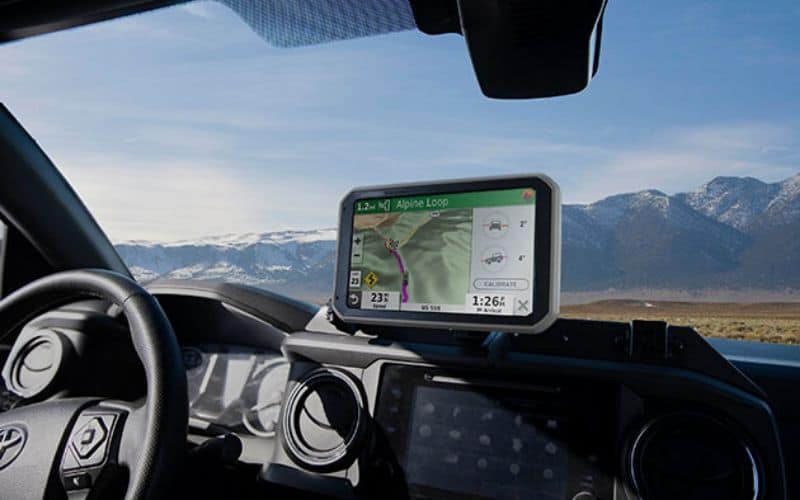
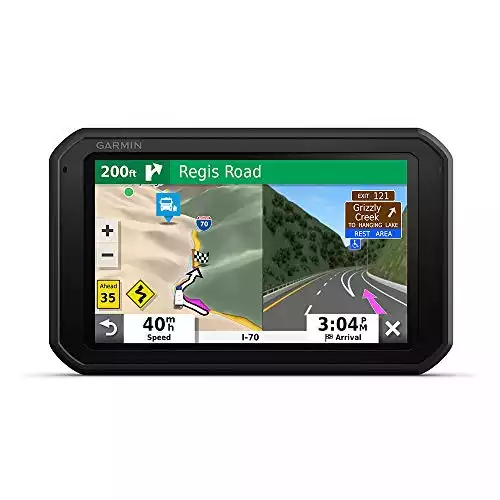
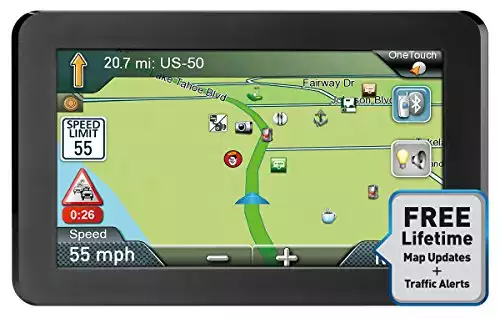
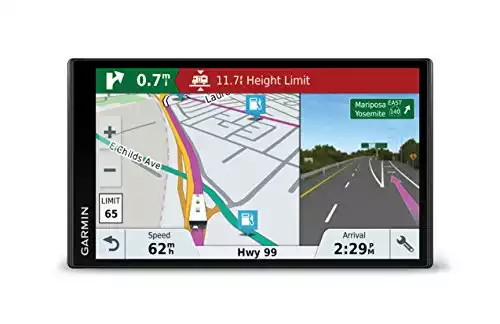
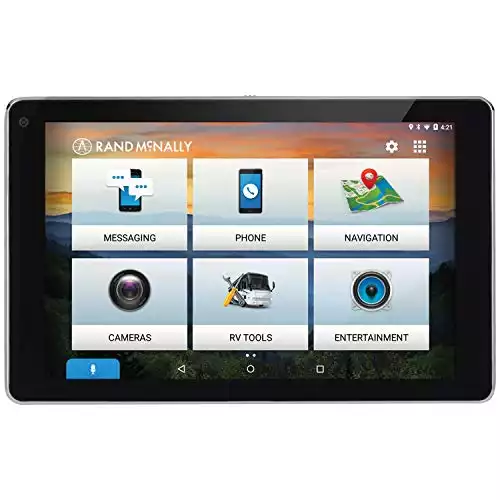
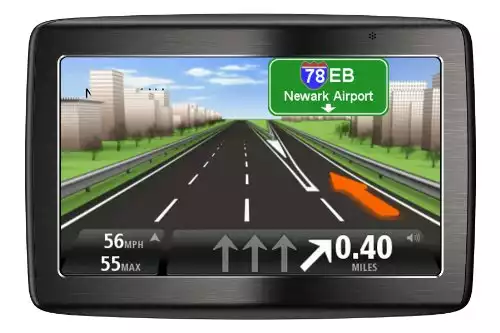
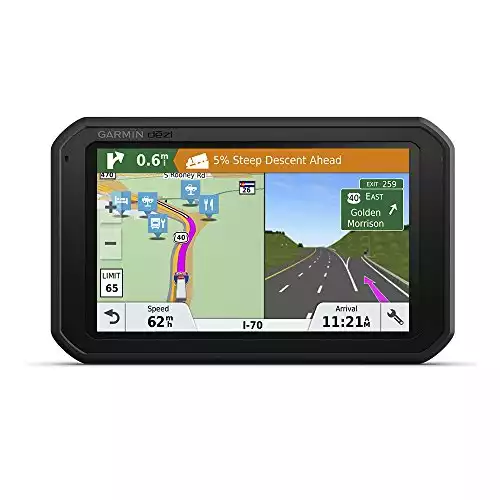


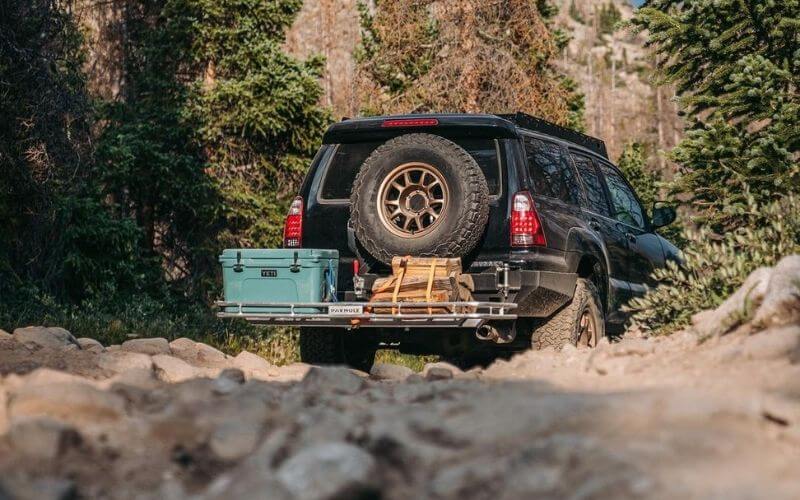
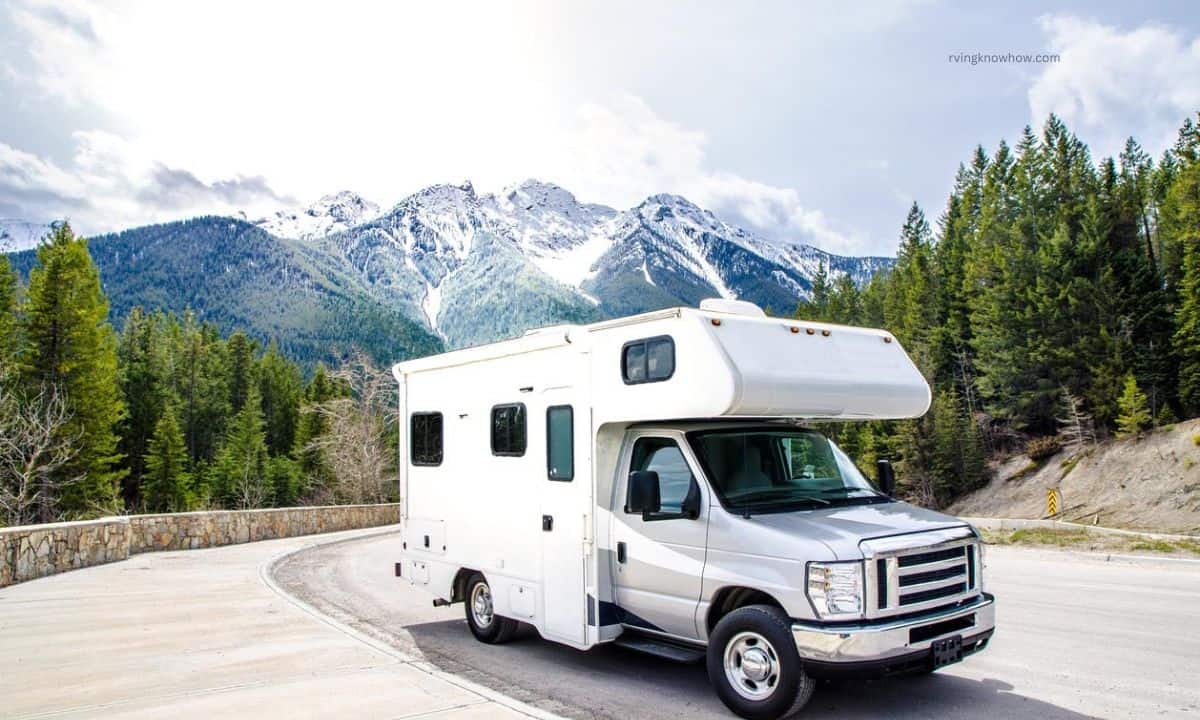
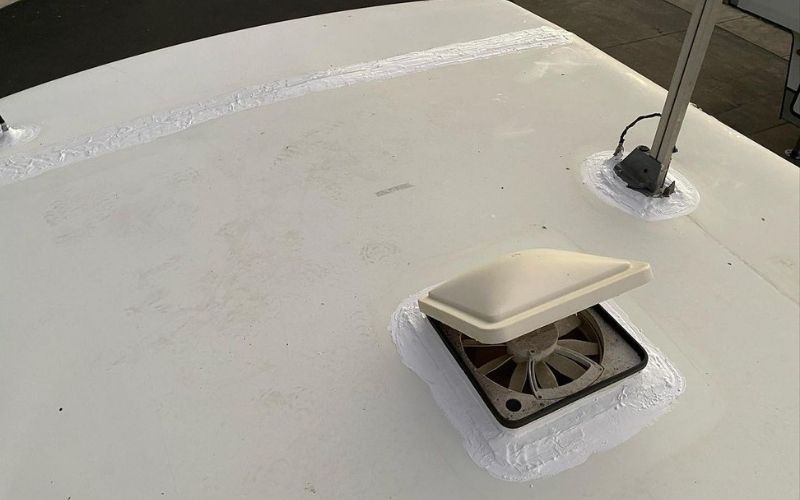
3 Comments
Kenneth Clark
2 years agoGarmin has always been a leader in GPS technology, and I would love to have a Garmin for my RV too. But I am wondering between the Garmi 890 and the 1090. Which should I choose?
Aaron Richardson
2 years agoHello Kenneth,
There is no difference between those two models. Only display Size increase in Garmin 1090. Choose whatever; it does not matter because other specs are equally the same.
Thomas King
2 years agoYour advice was timely. Up dating my old gps. Have been partial to Garmin as have them on my boat, truck and RV. Both gps and dash cam. I just ordered the RV 785 with Traffic.
Thank You
Thomas King